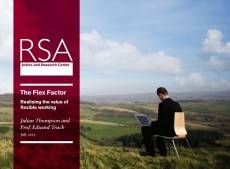July 22, 2013
Firms turn to flexible working and BYOD to placate mobile workplace rebels
 A new week and a new raft of surveys. Thankfully some of them throw up some rather interesting juxtapositions. Take the latest from Virgin Media which claims nearly half of UK office workers are now significantly free to choose how and where they work with over two thirds of organisations convinced that offering more technological choices and flexible working results in happier and more productive staff. Meanwhile, another survey from tech firm (what else?) VMware claims that over a third of UK employees would consider leaving their jobs if they couldn’t get their own way over using mobile devices at work.
A new week and a new raft of surveys. Thankfully some of them throw up some rather interesting juxtapositions. Take the latest from Virgin Media which claims nearly half of UK office workers are now significantly free to choose how and where they work with over two thirds of organisations convinced that offering more technological choices and flexible working results in happier and more productive staff. Meanwhile, another survey from tech firm (what else?) VMware claims that over a third of UK employees would consider leaving their jobs if they couldn’t get their own way over using mobile devices at work.

























May 21, 2013
Flexible working boosts employee satisfaction and lowers business costs
by Tim Clapham • Comment, Knowledge, Technology, Workplace
May 2013 played host to Work Wise Week, an initiative from Work Wise UK that aimed to promote and encourage smarter working practices to the benefit of businesses and employees. Cultural, economic and social changes are affecting attitudes to how we balance work and personal lives, and increasingly, mobility and technology is shifting away the need for the traditional 9-5 work patterns, replacing it with more flexible working practices. There are many benefits of flexible working and, as such, we are seeing more businesses starting to understand that forcing employees to work in an office does not guarantee productivity. (more…)